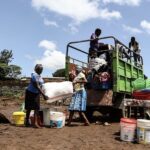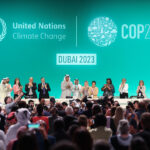Posts tagged with 'mitigation'
In Kenya and throughout east Africa, flooding this past April and May wreaked havoc, leaving a path of deadly destruction. The unprecedented deluge of heavy rainfall resulted in a catastrophe that many in Kenya have never witnessed. According to a June ...

Amazonian cities are diverse in opportunities and needs. The region’s biodiversity is among the world’s most important, but its cities’ sustainability challenges are less well-known. These jurisdictions require financial support and capacity building to create sustainable, conservation-oriented, equitable, urban green ...

Every three years, ICLEI hosts the ICLEI World Congress to showcase how subnational actors advance sustainable urban development worldwide. The most recent installment, ICLEI World Congress 2024, held June 18-21 in São Paulo, Brazil, converged over 1,500 global attendees to ...

In March 2024, the inaugural Buildings and Climate Global Forum convened more than 1,000 participants to spur action towards built environment decarbonization and resilience. The first-of-its-kind forum was welcome, as the sector needs a shakeup. The big issue on the table was ...

Over the past several months, the climate pattern El Niño has disrupted different regions and sectors across the world. Zimbabwe recently declared a state of disaster, due largely to El Niño-induced drought. The city government in Bogotá, Colombia, announced water rationing as reservoir levels ...

By early 2025, countries are due to unveil new national climate commitments under the Paris Agreement, known as nationally determined contributions (NDCs). These commitments form the foundation of international climate action, establishing emissions-reduction targets and other measures that countries promise ...

Climate-change-induced events such as heat waves and floods severely impact quality of life in urban areas. It can be financially disruptive and even fatal, disproportionately impacting settlements most vulnerable to climate risks. Greening of open spaces can be an important ...

In the crowded slums of Zambia, Africa, members of the Zambia Youth Federation, a social movement of the urban poor, conducted climate change research and presented it in an emotional spoken word poem. Their message let policymakers know how climate ...

At COP28, global climate leaders congregated in Dubai for the annual opportunity to review countries’ progress on emissions reductions and to increase climate ambition. One of the conference’s focal points was how to rapidly and equitably transition away from fossil ...

In Bogotá, Colombia, over 3,000 people die prematurely each year due to exposure to air pollution—namely from PM2.5, a fine particulate matter produced by vehicle exhaust, burning and industrial outputs. Bogotá is not alone: According to 2021 data, of 174 ...

The issue of Delhi’s poor air quality resurfaces periodically in public consciousness. It garners attention on social media, in newspapers and in scientific studies, largely during winter months. During this period, Delhi’s air quality index drops from “poor” to “severe” ...

By David Waskow, Jennifer Layke, Nate Warszawski, Preety Bhandari, Gabrielle Swaby, Natalia Alayza, Jamal Srouji, Mario Julien Díaz, Edward Davey, Rogier van den Berg, Roman Czebiniak, Paige Langer and Nathan Cogswell on December 19, 2023
The COP28 climate talks began with a new fund to address the increasingly severe losses and damage vulnerable countries face from climate impacts and concluded with the first international agreement to tackle climate change’s main driver: fossil fuels. Those bookends to the Dubai summit ...

In Asia, 14 countries — accounting for 26% of global transport emissions in 2019 — have made economy-wide net zero commitments. Momentum towards zero-emission transport is growing with countries enhancing ambition and including transport-related targets in their nationally determined contributions (NDCs). However, ...

In the Seychelles archipelago in east Africa, flooding and erosion caused by rising sea levels pose an imminent threat to the country’s many low-lying islands. At the same time its mangrove forests, which serve as a vital buffer against these ...

By Sophie Boehm, Clea Schumer, Emma Grier, Louise Jeffery, Judit Hecke, Joel Jaeger, Claire Fyson, Kelly Levin, Anna Nilsson, Stephen Naimoli, Joe Thwaites, Katie Lebling, Richard Waite, Jason Collis, Michelle Sims, Neelam Singh, William Lamb, Sebastian Castellanos, Anderson Lee, Marie-Charlotte Geffray, Raychel Santo, Mulubrhan Balehegn, Michael Petroni and Maeve Masterson on November 20, 2023
Today’s climate change headlines often seem at odds with each other. One day, it’s catastrophic wildfires wreaking havoc around the world; the next, it’s an optimistic piece on the rapid scale-up of solar and wind power. Taken together, such stories ...




























